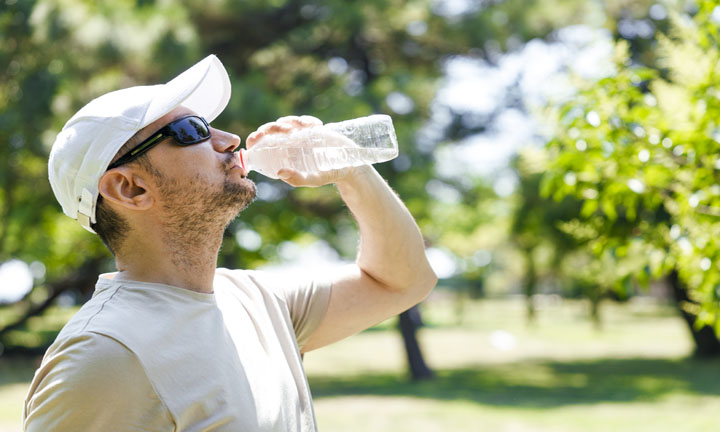Current Suspected Overdose Deaths in Delaware for 2025: Get Help Now!
Find school water testing results and additional resources
Attention Medicaid Participants: Eligibility Renewals Restarted April 1, 2023
Josette Manning, Secretary
Jen Brestel, Director of Communications
302-605-0577
Email: Jennifer.brestel@delaware.gov
DPH Media Relations Coordinator Contact:
Laura Matusheski
Email: DPHMedia@Delaware.gov
Date: July 20, 2023
DHSS-7-2023
Delaware Division of Public Health Offers Tips for Managing Rising Temperatures this Summer
DOVER, Del. (July 20, 2023) - With the summer season in full swing, extreme heat conditions can pose a serious threat to our health and well-being. The Delaware Division of Public Health (DPH) reminds Delawareans that it is important to take extra precautions to stay safe and healthy.
Prolonged exposure to high temperatures can lead to heat exhaustion, heat stroke and other serious health complications. Heat exhaustion can cause a variety of symptoms, including excessive sweating, dizziness, nausea, headache and muscle cramps. If left untreated, symptoms can progress to more severe conditions such as confusion, trouble breathing and even loss of consciousness. Although rare, heat stroke is a true medical emergency that should be addressed by getting out of the sun and seeking immediate medical attention.
Delawareans are advised to follow these steps to avoid heat-related illnesses:
Avoid direct sunlight and find a well-ventilated, air-conditioned place. If your home does not have air conditioning, spend some time in an air-conditioned public facility, such as a library or mall. Even if the windows are slightly open, children, individuals or pets should never be left in cars. To remind yourself that a child is in the car, the Centers for Disease Control (CDC) recommend keeping a stuffed animal in a car safety seat unless a child is buckled in it. When the child is buckled in, place the stuffed animal in the front with the driver. Be certain that everyone has exited the car.
To prevent sunburn, apply sunscreen with an SPF of 15 or higher 30 minutes before going outside and reapply it as directed.
Keep yourself hydrated. In the heat, CDC recommends drinking water every hour, regardless of activity level. Instead of drinking caffeinated, alcoholic and carbonated drinks, reach for water when you're thirsty. Regular urination and pale or clear urine are signs that a person is drinking enough fluids. Dehydration symptoms include dark urine, thirst, dry mouth, dry lips, headaches and dizziness. In order to replace salt and minerals lost through heavy sweating, dehydrated individuals should drink a sports drink or fruit juice.
Don't drink more water than you need to quench your thirst. It is possible to develop hyponatremia, a potentially fatal loss of sodium levels, when you drink too much water. Monitor adults who are at risk of heat exhaustion or heat stroke twice a day. Children and infants require more frequent supervision. In case of severe symptoms such as nausea, vomiting, confusion, seizures or coma, call 911.
Limit outdoor activity, especially mid-day when the sun is hottest. Exercise or hold sports team practices early in the morning or in the early evening. If you must be outside, wear lightweight, light-colored clothing. Wear a hat or use an umbrella for shade. Avoid taking a cold shower too soon after coming in from hot weather; it can cause hypothermia, especially in the elderly and children. It is better to use cool water than ice cold water in these cases.
Stay informed. As well as knowing the warning signs of heat-related illnesses, be aware of local heat alerts. Infants and children younger than 4 years old, those 65 years and older, outdoor workers, athletes and obese people are at high risk of heat-related illness, along with those taking certain medications, having poor circulation, high blood pressure and living with mental illness. Fever, sunburn, dehydration and alcohol consumption are also risks. Check on a friend or neighbor during extreme heat events.
For more information, visit the CDC website at cdc.gov/extremeheat/warning.html.
Make a Heat Plan for Pets:
The Division of Public Health and its Office of Animal Welfare also urge pet owners to make a plan for caring for their pets. Animals at the greatest risk of stress from the heat include pregnant or lactating animals, very young and older animals, animals with darker coats, obese pets, short-nosed dog breeds and animals with chronic health conditions. Signs of heat stress can include panting, increased salivation, restlessness, muscle spasms, increased heartbeat and body temperature, weakness, lack of coordination, bright red or pale and sticky gums, vomiting, diarrhea and depression.
By following these steps, we can all stay healthy and safe during extreme heat conditions. Let's make this a summer to remember for all the right reasons.

The Delaware Division of Public Health (DPH), a division of the Delaware Department of Health and Social Services, is a nationally accredited public health agency recognized by the Public Health Accreditation Board for its outstanding dedication to driving change through innovation. Delaware Health and Social Services is committed to improving the quality of the lives of Delaware's citizens by promoting health and well-being, fostering self-sufficiency, and protecting vulnerable populations.
Delaware Health and Social Services is committed to improving the quality of the lives of Delaware's citizens by promoting health and well-being, fostering self-sufficiency, and protecting vulnerable populations.